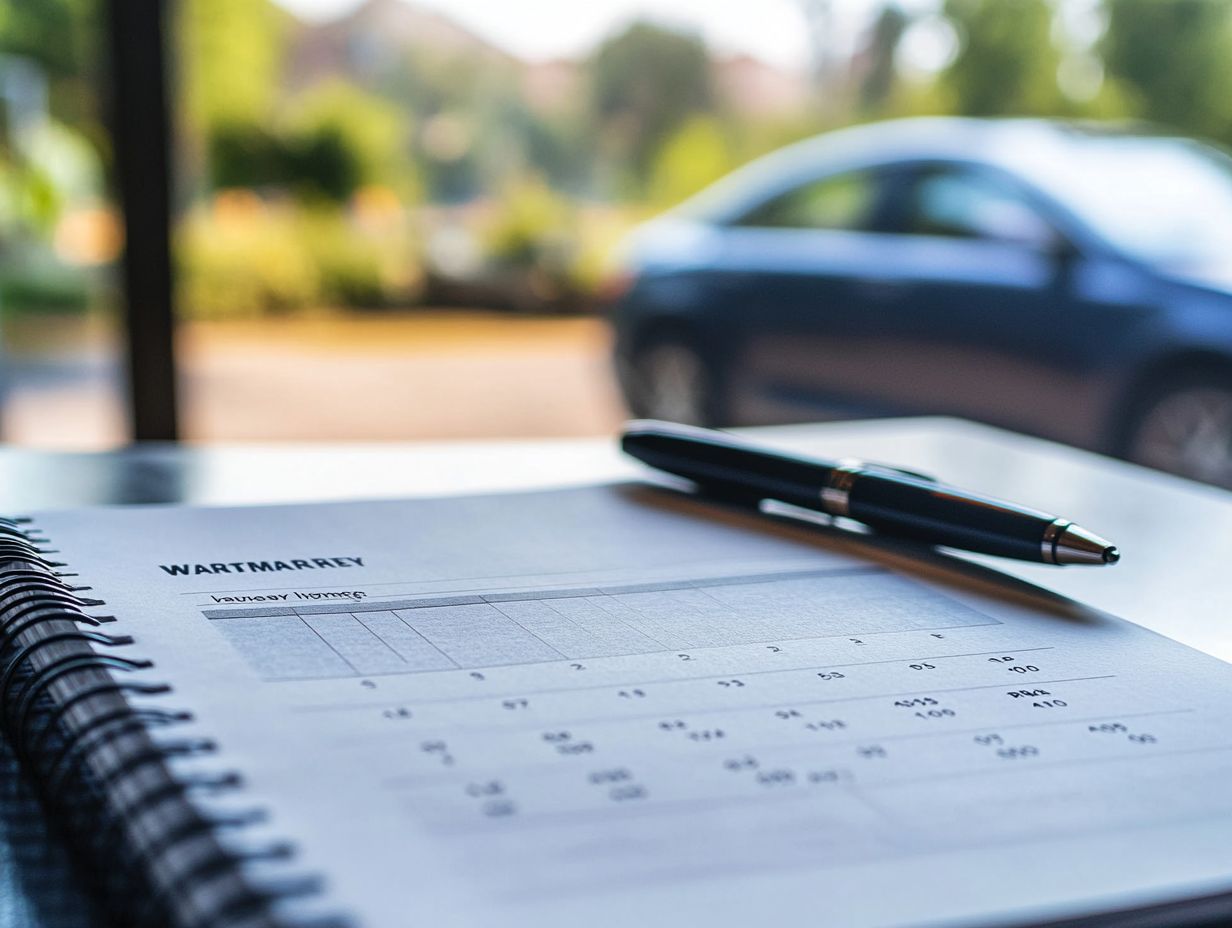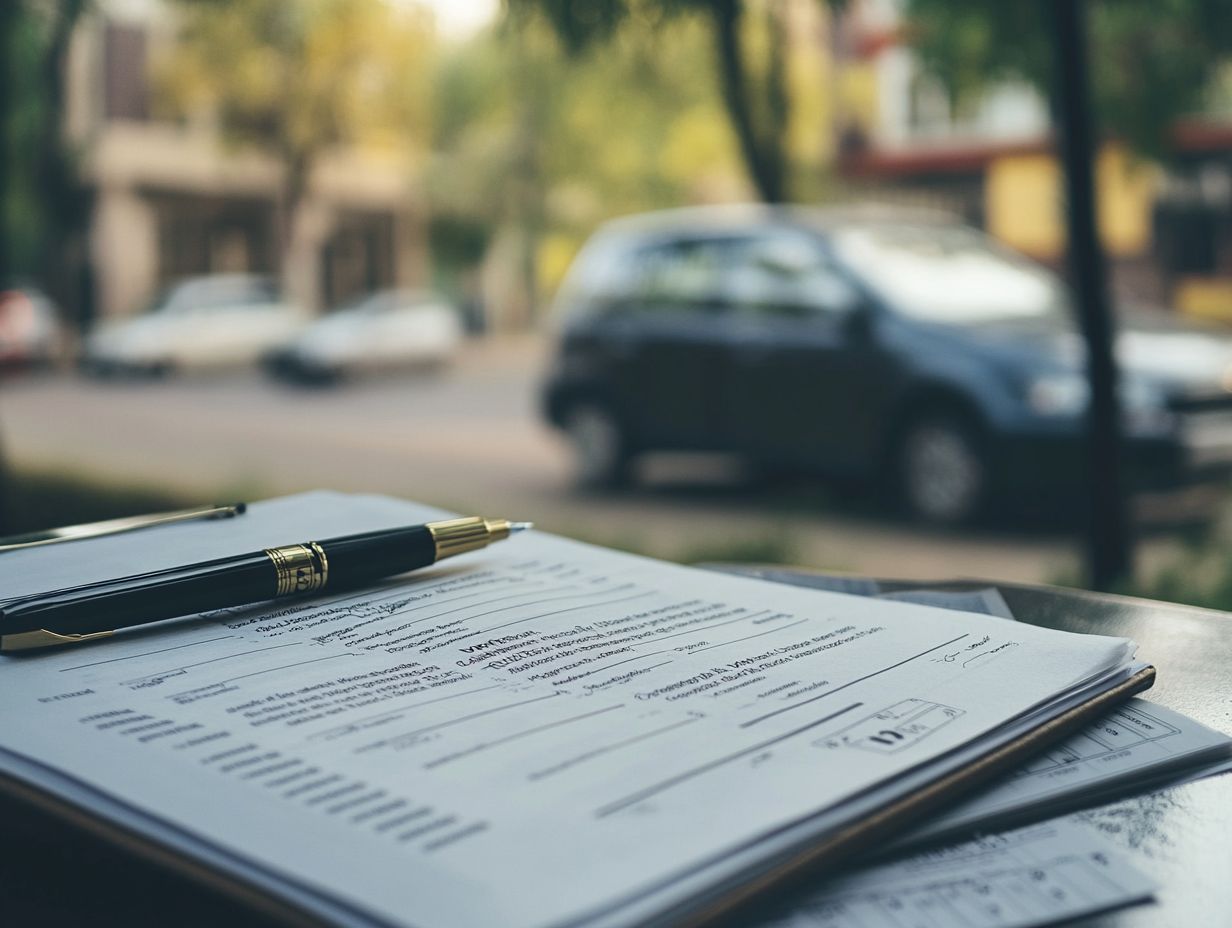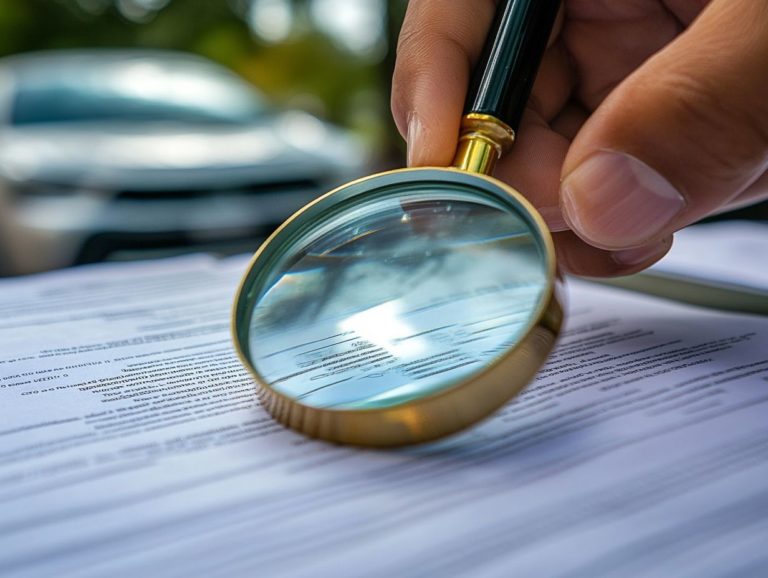Is Your Car Still Under Warranty?
When it comes to car ownership, grasping the ins and outs of warranties is essential for safeguarding your investment. A car warranty acts as your safety net, offering coverage for repairs and maintenance, but navigating the details can be tricky.
Let’s dive into the world of car warranties and see how they can protect you! You ll learn what a car warranty is, the various types available, and how to check if your vehicle is still under coverage.
It s also important to understand the benefits of having a warranty and to explore your options if your coverage has lapsed. Equip yourself with knowledge that can save you both money and stress in the future!
Contents
Key Takeaways:

- Know the basics of car warranties, including the different types available.
- Learn how to check the status of your car’s warranty and understand what it covers.
- Understand the benefits of having a car under warranty, such as cost savings and peace of mind.
Understanding Car Warranties
Understanding car warranties is essential for you as a vehicle owner. These warranties provide crucial protection against repair costs and potential issues that may arise with your vehicle s components over time.
Typically, a warranty covers a range of concerns, including transmission problems and manufacturer defects. This coverage can save you a significant amount of money in the long run.
Familiarizing yourself with the terms and details of your warranty offers peace of mind and ensures you re prepared for any maintenance or repairs during your ownership journey.
Understanding car warranties is vital for making informed decisions and keeping your vehicle in optimal condition.
What is a Car Warranty?
A car warranty is a contractual agreement that provides protection against certain repair costs and issues during your ownership of the vehicle. This essential safeguard covers a wide range of mechanical failures and defects, allowing you to seek repairs without facing substantial out-of-pocket expenses.
Warranties typically address critical components like the engine, transmission, and electrical systems. The specifics can vary significantly among manufacturers. The types and durations of coverage whether comprehensive or powertrain warranties play a crucial role in determining the level of protection you receive.
Understanding these variations is vital to ensure you are adequately shielded from unexpected repair costs throughout the life of your vehicle.
Types of Car Warranties
There are several types of car warranties available, ranging from manufacturer warranties that typically cover vehicle defects to extended warranties that provide additional coverage for repairs beyond the original terms.
Understanding these options empowers you to make informed decisions about your vehicle protection. For instance, bumper-to-bumper warranties offer extensive coverage, encompassing nearly all components from the engine to the electrical systems while excluding only routine maintenance.
On the other hand, powertrain warranties focus specifically on major mechanical components like the engine and transmission. This gives you peace of mind if you re concerned about performance. You might also consider third-party extended warranties, which can cover various repairs and often come with flexible terms.
Exploring these warranty types will help you find the right balance of coverage and cost, perfectly tailored to your unique driving experiences.
How to Check if Your Car is Still Under Warranty

To determine if your car is still under warranty, check certain documents or use your vehicle identification number (VIN) to access warranty information from the manufacturer or warranty provider.
This means reviewing records that outline the original coverage terms and any maintenance performed on your vehicle.
By doing so, you ll empower yourself to make informed decisions about repairs and services, ensuring your investment is well cared for.
Don t miss out on the savings! Check your warranty status today and stay ahead of costly repairs!
Where to Find Warranty Information
To find warranty information on your vehicle, refer to the official documents provided by the manufacturer, utilize your vehicle identification number (VIN) which uniquely identifies your vehicle or contact your warranty company directly for assistance.
These options effectively guide you in understanding your vehicle s coverage and ensure you have access to all the details you need. The VIN, or Vehicle Identification Number, is particularly important for obtaining precise warranty information tailored to your specific model.
It s wise to keep your personal records organized and accessible. This will streamline the process of locating any official documents. You need to ensure accuracy, not only for warranty claims but also for maintaining your vehicle’s overall value and receiving proper service throughout its lifespan.
How to Determine Warranty Coverage
Determining your warranty coverage requires a careful look at the warranty details and an understanding of the specific terms set by the manufacturer. You should also consider your vehicle’s history, maintenance records, and any previous owners.
This process helps you understand the protections available for your vehicle. It empowers you to make informed decisions about repairs and services. By closely analyzing the warranty terms, you can pinpoint what is included and what is excluded an essential step for ensuring effective vehicle protection.
Understanding your vehicle’s history, including any reported accidents or repairs, can significantly impact your coverage status. Maintenance logs are invaluable documents that showcase the care your vehicle has received over time. This information can influence warranty validity and bolster your confidence as a consumer.
By piecing together these elements, you’ll gain a clearer picture of your coverage and effectively safeguard your investment.
Benefits of Having a Car Under Warranty
Having a car under warranty presents a wealth of advantages, including significant savings on repair costs. It also provides reassurance that your vehicle is protected against potentially costly issues that may arise in the future.
This warranty protection alleviates the financial strain from unexpected repairs and maintenance, ultimately enriching your overall ownership experience.
Cost Savings and Peace of Mind

The cost savings linked to a car warranty can be substantial, as it protects you from unexpected repair expenses that often accompany vehicle wear and tear.
Imagine saving big on repairs! For example, an engine malfunction can lead to repair costs soaring into the thousands. But with a warranty in place, much of that financial burden can be alleviated. This not only helps preserve your hard-earned savings but also keeps your vehicle in optimal condition, preventing further issues from cropping up later.
Having a warranty provides a profound sense of peace of mind. You can navigate your daily commutes without the nagging worry of steep repair bills lurking just around the corner. This combination of financial relief and emotional assurance makes car warranties an essential asset for today s savvy consumers.
What to Do if Your Car is No Longer Under Warranty
If your car is no longer under warranty, you have a range of options for extended coverage that can shield you from unexpected repair expenses while offering ongoing peace of mind.
Options for Extended Coverage
Options for extended coverage abound. You can choose between purchasing an extended warranty from the manufacturer, opting for third-party warranties, or exploring maintenance plans that offer various levels of protection for your vehicle.
Each of these choices comes with its own set of advantages and disadvantages. Manufacturer warranties often provide reliable coverage that aligns with service standards, though they might come with a heftier price tag. On the other hand, third-party warranties may offer more competitive rates, but the terms and reliability can differ widely. Maintenance plans typically cover routine services, but they might fall short when it comes to unexpected breakdowns.
Understanding these nuances and carefully evaluating the coverage details is essential. This will help you determine which option offers the best overall vehicle protection without sacrificing quality or support.
Maintaining Your Car for Longevity
Maintaining your car through regular service and repairs is crucial for ensuring its longevity and best performance.
By following a regular check-up schedule monitoring fluid levels, tire pressure, and brake condition you can significantly enhance your vehicle s overall health. Comprehensive inspections not only catch potential issues early but also allow for preventive steps that can help you avoid costly repairs.
Regular servicing and necessary repairs help you understand your vehicle s needs. This knowledge empowers you to make informed decisions that enhance its durability. Emphasizing ongoing care ultimately helps maintain the price you can get if you sell your car later and keeps your driving experience safe and reliable.
Frequently Asked Questions

Is Your Car Still Under Warranty?
No, my car is no longer under warranty.
How long does a car warranty typically last?
A car warranty usually lasts for a certain number of years or a certain number of miles, whichever comes first. It can vary depending on the manufacturer and the type of warranty.
What does a car warranty cover?
A car warranty typically covers repairs and replacements for certain parts and components of the car. It may also include roadside assistance and other additional services.
Can I extend my car warranty?
Yes, you may be able to extend your car warranty for an additional cost. This can provide you with coverage for a longer period of time or for more services than the original warranty.
How can I check if my car is still under warranty?
You can check if your car is still under warranty by referring to your owner’s manual, contacting the manufacturer, or checking with your dealership. You may also be able to check online using your car’s vehicle identification number (VIN).
What happens if my car is no longer under warranty?
If your car is no longer under warranty, you’ll need to pay for all repairs. Don’t wait regular maintenance can save you from unexpected costs!
Got questions about warranties? Let s dive into some frequently asked questions.
Ready to keep your car in top shape? Schedule your car maintenance or check your warranty status today!





